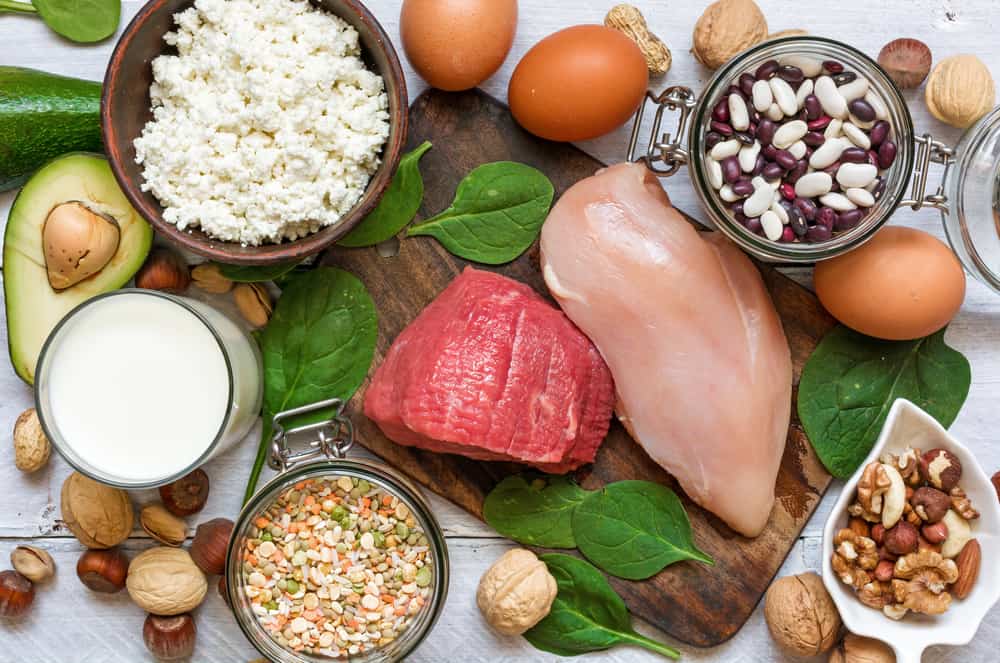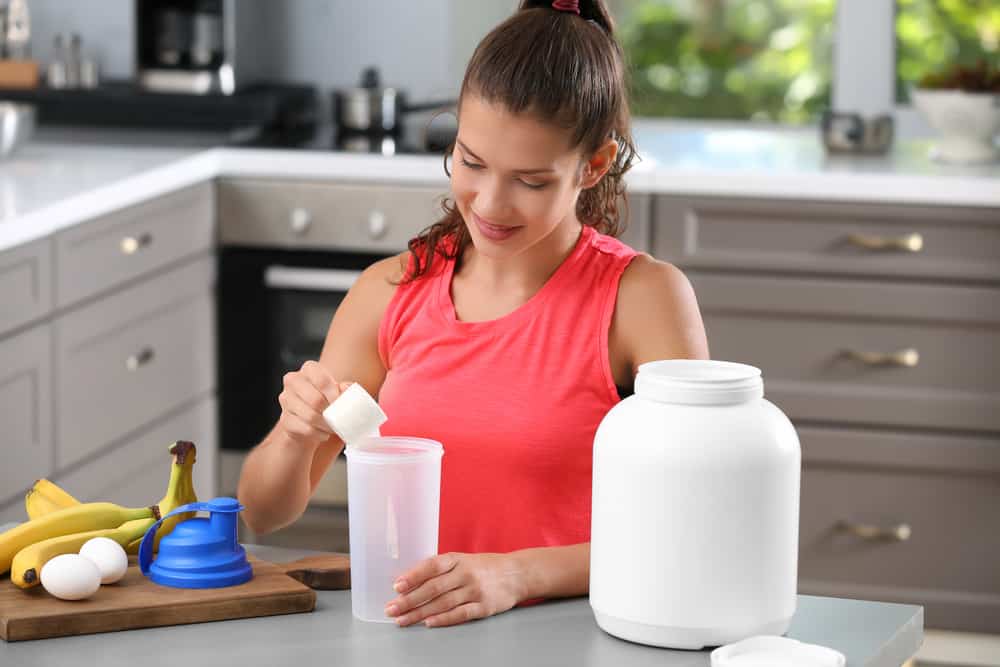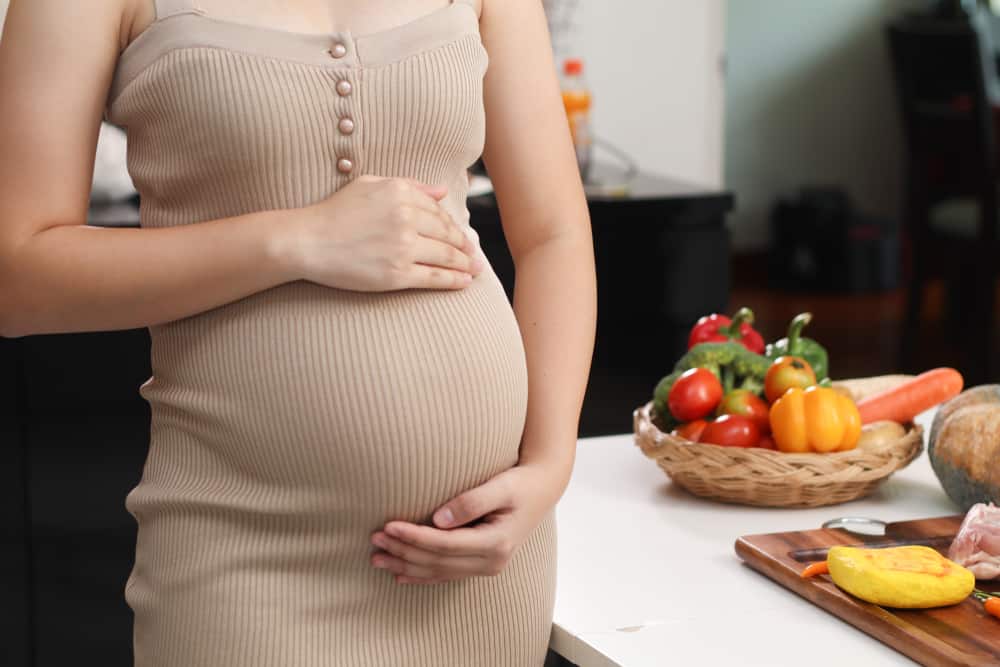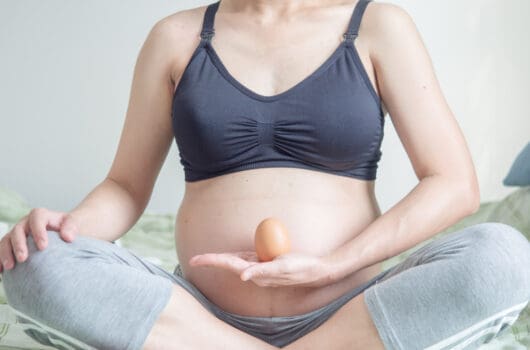When you’re pregnant, one of the top things on your to-do list is to figure out what a healthy pregnancy diet may be. Pregnant women need a lot more nutrients than non-pregnant women to support the growing fetus. While there isn’t a magic formula that you can go with, one thing remains certain — you need plenty of fruits, vegetables, protein, healthy fats and grains.
Not many people think about protein and pregnancy, but protein is, arguably, one of the most important nutrients that pregnant women need. In short, most pregnant women will need about 60 grams of protein per day, so this article will look at what can effect how much protein you really need when you’re pregnant, as well as the different healthy protein sources that you can include in your diet.
What Does Protein Do?
Protein contains the building blocks needed for development. As your baby develops, it’s going to need a lot of protein to develop skin, muscles, hair, and other types of tissues. The mother will also need protein to regenerate new cells and to stay healthy. Without proteins, your body won’t be able to function properly.
Protein does a lot for your body. When you’re pregnant, your body will synthesize 15% more protein in the second trimester and 25% more protein in the third trimester from food intake. Some of the things that protein is needed for include:
- Growth of new cells and tissues
- Repair of new and damaged tissues
- Hormone and enzyme production
- Aid in muscle function
- Oxygen movement
It is vital that pregnant mothers get enough protein in their diet for not only themselves, but also for their baby. Those who do not get enough protein may be at risk for more pregnancy complications. The mothers may also struggle with more health complications as well.
Having a baby is already a huge strain on the body, so it’s crucial that the body has all of the resources it needs to repair itself. If not, the mother can feel easily fatigued throughout their entire pregnancy. The added stress may follow them after giving birth.
The Different Types of Amino Acids
If you’re going down the rabbit hole on the types of amino acids that you need, you’ll likely hear the terms ‘‘essential amino acid’, ‘nonessential amino acid’ and ‘conditional amino acid’ regularly. Proteins are broken down into amino acids that can be categorized into one of these three categories.
Essential amino acids are amino acids that cannot be made by the body. You must get these amino acids from food.
Nonessential amino acids are amino acids that our bodies can make on their own even if we don’t get them from food, and conditional amino acids are not essential or needed. The only time that the body needs these amino acids is when it’s ill or stressed.
In general, pregnant women do not need to really worry about their nonessential or conditional amino acid intake. They only need to make sure that they are consuming enough essential amino acids from their protein sources. Different protein sources will contain different types of essential and nonessential amino acids, which is why it’s important to eat a lot of different types of protein regularly.
How Much Protein Is Needed
According to the University of California San Francisco, you need a minimum of 60 grams of protein a day when you’re pregnant. This should account for about 20% to 25% of your daily calorie intake.
Some other experts recommend that you eat a lot more than just 60 grams of proteins a day. Instead, these experts recommend calculating the amount of protein that you need by your body weight. These sources recommend eating 0.75 grams of protein for every kilogram of bodyweight. Pregnant women should add another 6 grams of protein on top of the final amount.
Let’s say that you weigh 70 kilograms. That means that you should eat at least 58.5 grams of protein a day. You don’t necessarily have to eat that amount of protein every day. You can average it across the entire week. For example, if you can’t much stomach food one day, just make sure that you eat more protein the next day.
Good Sources of Protein

Fortunately, getting enough protein into your diet when pregnant is quite easy. A lot of ingredients naturally contain a lot of protein, so all you need to do is eat a healthy, balanced diet. Some examples of good sources of protein include:
- Almonds, which contain about 6 grams of protein per 1-ounce serving
- Broccoli, which contains about 3 grams of protein per every 1-cup serving
- Chicken, which contains approximately 23 to 25 grams of protein per 3-ounce serving
- Egg, which has about 6 grams of protein in every one large egg
- Lean beef, which contains 26 grams of protein per every 3-ounce serving
- Lentils, which contain about 18 grams of protein per 1-cup serving
- Roasted turkey, which contains about 23 grams of protein per 3-ounce serving
- Tuna, which contains about 15 to 23 grams of protein per 3-ounce serving
Incorporating these foods into your diet shouldn’t be too difficult if you eat a regular diet; however, if you have dietary preferences and are vegetarian or vegan, eating enough protein may be a little more difficult.
The best way to incorporate more protein into your diet is to eat more healthy snacks throughout the day. For example, eat hummus with carrots or celery instead of chips. Or, try having a low-fat fruit yogurt for breakfast instead of pancakes. Read the nutritional label before purchasing any snacks or ingredients to get a better idea of the amount of protein that each ingredient contains.
Good Protein Sources for Vegetarians and Vegans
Some vegetarians and vegans are concerned with whether they’d be able to easily get the amount of protein that they need to support a healthy pregnancy. Fortunately, there are actually many plant-based foods and combos that contain all of the essential amino acids that you’d find in meat. Some great sources of protein include:
- Buckwheat, which contains about 6 grams of protein per 1-cup serving
- Chia seeds, which contain about 4 grams of protein per every 2-tablespoon serving
- Quinoa, which contains approximately 8 grams of protein per 1-cup serving
- Spirulina, which contains about 4 grams of protein per every 1-tablespoon serving
- Tofu, which contains about 8 grams of protein per every 3-ounce serving
Pregnant women who are vegetarians or vegan may need to alter their diet slightly to accommodate for their growing need to consume more protein. Those who are vegan or vegetarian should seek more regular prenatal care to ensure that their baby is developing properly and healthily. They should also let their healthcare provider know about their dietary preferences ahead of time.
Protein Powders

Protein powders are also a good source of protein. If you need additional protein in your diet, consider adding a protein shake. It’s a great supplement for those who are struggling with morning sickness or food aversions. Protein powders are also a great fix for pregnant mothers who are simply too fatigued to cook up a meal or are vegans or vegetarians.
When choosing a protein powder, you have two options: whey or plant-based. Whey proteins have all the essential amino acids that you’ll need. If you go for a grass-fed option, you’ll also get some anti-inflammatory omega-3 fatty acids.
Plant-based protein, on the other hand, may be missing some essential amino acids. It really depends on its composition, so you need to read the nutrition label carefully to get a better understanding of what types of amino acids are in each protein powder.
Before adding a protein shake to your diet, speak to a healthcare provider first. In most cases, you won’t need to add any protein supplements to your diet at all. The only time that you’ll need to take a protein supplement is if you are having difficulties stomaching food or if your dietary preferences make it difficult for you to get enough protein in your diet.
Effects of a Protein Imbalance
What happens if you’re simply not getting protein in your diet? Studies have found that insufficient protein intake during pregnancy will lead to the activation of the amino acid response (AAR) pathway. This basically means that the mother’s body will start to break down its own skeletal muscles in order to get enough protein to support the baby.
Although this might mean that the baby will get enough protein to survive, the breakdown of the mother’s own skeletal muscles is a huge burden on their body. It puts the cells and tissues under a tremendous amount of stress. The body will “memorize” this stress and transfer the stress through the placenta to the baby.
This means that the baby has to go through unnecessary stress. This stress may follow them past being in the womb and all the way to childhood and even adulthood. Most surprisingly is that these stresses can result in permanent genetic changes to both the mothers and the babies.
Issues Associated With Having Too Little Protein
Having too little protein can have a profound impact on your baby’s development. For one, the stress of not having enough protein will pass through the placenta and transfer to the fetus. This can result in stunted growth and a low birth weight.
A baby with low birth weight may not necessarily be unhealthy; however, they may face some additional difficulties in life. For example, they may have difficulties eating, gaining weight and fighting off infections. These babies may also develop birth defects, and have an increased risk of developing diabetes or becoming overweight later in their lives.
Issues Associated With Having Too Much Protein
Eating too much protein and too little carbs may not always be a good thing either. Moderation is key, and you shouldn’t go too heavy on the protein either.
A recent study in 2014 found that too much protein and too few carbohydrates resulted in slower-growing babies. These babies had higher concentrations of reactive oxygen species and ADP in their bodies, which means that they struggled with more metabolic stress. They also had lower metabolic rates. Both the mothers and the babies had higher blood pressure than normal as well.
Another study conducted in 2018 found that pregnant mothers who ate too much protein were more at risk of developing gestational diabetes. Mothers who develop gestational diabetes have an increased risk of developing type II diabetes after giving birth. They are also more at risk of developing gestational diabetes again during future pregnancies. Gestational diabetes also has long-term negative effects on the baby as well. These effects can follow them through to adulthood.
Diet Is Very Important When Pregnant

Your diet is super important when you’re pregnant. Your dietary changes will change as your baby develops, and you’ll need more nutrition than ever before. Getting enough protein, in particular, is very important, as proteins are the building blocks of life. Without them, you and your baby will be under a lot of stress. Fortunately, there are many ways that you can add more of this nutrient to your diet.
If you have any further questions or concerns, make sure to speak with a healthcare provider. If you’re unsure whether your diet contains enough protein, speak with a dietician! It’s always better to be safe than sorry.
